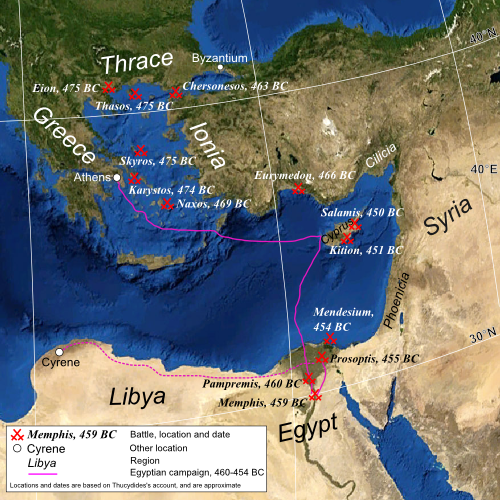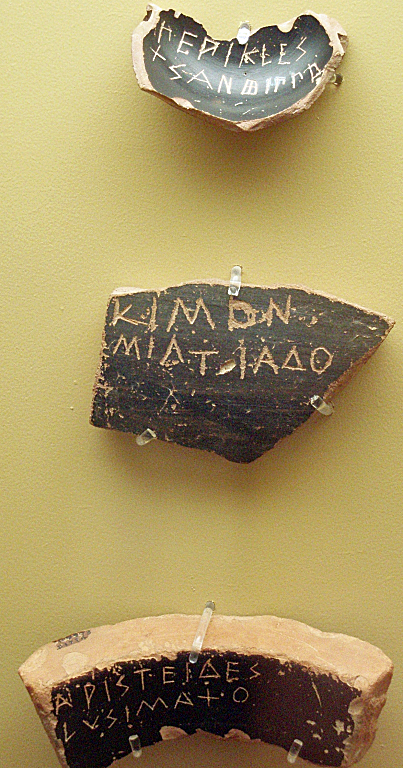In this episode, we discuss the 460s BC, including the battle of the Eurymedon River (in Asia Minor), which sees Kimon winning a dual land and naval victory over the Persians; Sparta's clashes with the anti-Spartan coalition of Argos, Tegea, Eleia, and Mantineia; the assassination of Xerxes and eventual ascension to the Persian throne of his son, Artaxerxes; Themistokles' medism trial and his defection to the court of Artaxerxes; the revolt of Thasos from the Delian League; the debilitating earthquake in the Peloponnesos and the resulting Helot revolt; the political downfall and ostracism of Kimon, which leads to the severing of the Athenian-Spartan alliance; and the democratic reforms, assassination of Ephialtes, and ascendency of Perikles
469 BC - Cimon carries the war against Persia into Asia Minor and wins dual land and naval victory at Eurymedon River in Pamphylia, as his land and sea forces capture the Persian camp and destroy or capture the entire Persian fleet; many new allies of Athens are now recruited, such as the trading city of Phaselis on the Lycian-Pamphylian border
468 BC - Death of Aristides; Sparta faces trouble near home, chiefly from Arcadia with the support of Argos; the Spartans win two narrow victories at the battles of Tegea and Dipaea
466 BC - Themistocles tried for Medism in absentia and condemned
465 BC - Xerxes of Persia, together with his eldest son, is murdered by one of his ministers, Artabanus, and the general, Megabyzus, is thought to have been one of the conspirators in the assassination; Artabanus gains control of the empire for several months, but he is later betrayed by Megabyzus and is killed by Xerxes' youngest son, Artaxerxes (r. 465-427 BC); Thasos, which controlled some markets and a gold mine in Thrace, revolted due to trade conflicts with Athens, so they were besieged by Cimon and the fleet of the Delian League; during the siege, the Athenians make their first attempt to establish a colony on the Strymon for mines and timber, by sending out 10,000 settlers, both Athenians and allies, to occupy Ennea Hodoi ("Nine Ways", later re-founded as Amphipolis)
Winter 465/4 BC - The Thasians, hard-pressed by the ongoing Athenian siege, appeal to Sparta as hegemon of Hellenic League, to assist them by invading Attica; Sparta, unknown to Athens, agrees to invade Attica the following spring; Athenian forces at Ennea Hodoi are defeated by Thracians at Drabescus; beginning of the democratic custom of burying together, without distinction of family or rank, all who had died in war for Athens; start of ritual for public funerals and funeral orations (logoi epitaphioi)
464 BC - Themistocles, who is in exile, approaches Artaxerxes seeking Persian help in regaining power in Athens; Artaxerxes is unwilling to help him, but instead gives him the satrapy of Magnesia; Sparta's planned invasion of Attica is called off after they suffer the effects of a severe earthquake which is then followed first by large-scale Helot in Eurotas valley and then Messenian Helots revolt along with a few communities of the perioikoi; Archidamos organizes the defense of Sparta and the rebels retreat to and fortify Mount Ithome
463 BC - After a two year siege and without hope of assistance, Thasos surrenders under terms: as a result, Thasos sees the destruction of its walls, surrender of ships, payment of indemnity, forced annual tribute, abandonment of its markets and mines in Thrace; first mention of Athens confiscating the ships of an ally; not long after his return from Thasos, Ephialtes and Pericles attempt to get Cimon ostracized for allegedly accepting bribes from King Alexander of Macedon not to conquer part of his territory; though Cimon is acquitted his influence on the Athenian people begins to wane
462 BC - After three years of trying to conquer the mountain stronghold of Mt Ithome in Messenia, where a large force of rebel helots have taken refuge, Sparta finally appeals to Athens for aid because of the Athenians’ supposed expertise in siege warfare; a famous debate takes place in Athens, in which Ephialtes, the democratic leader, recommends no help be sent and letting haughty Sparta be trampled underfoot, while Cimon, in accord with his policy of cooperation with Sparta, successfully urges the assembly “not to suffer Hellas to be crippled nor their city to be robbed of its yoke-fellow”; Cimon's argument prevails and he undertakes an expedition to help Sparta but after their initial attempt to storm Mt Ithome fails, the Spartans begin to fear the daring and ‘revolutionary spirit’ of the Athenians and their possible subversive influence on the helots; retaining their other allies, the Spartans send the Athenians home, an insult that causes the collapse of Cimon's popularity
Winter 462/1 BC - Cimon is ostracized after Ithome disgrace; the breach between Athens and Sparta was now irreconcilable and leads to the formal dissolution of the Hellenic League; instead, Athens makes alliance with Sparta’s most bitter rival, Argos; Ephialtes and Pericles make effort to increase democratic elements in the Athenian government; they pass laws that strip the Areopagus of all authority except jurisdiction in homicide cases and matters of a religious nature; these powers are transferred to the people, i.e. the Council of 500, the Assembly, and the popular law courts; office of judge is now a paid position and is recruited by lot from a list to which every citizen can have his name added; the Areopagus (filled with ex archons and is a center of conservatism) essentially ceases to be an effective political force
461 BC - Ephialtes assassinated; Pericles, Alcmaeonidai on his mother’s side, now rises as preeminent democratic Athenian politician





No comments:
Post a Comment